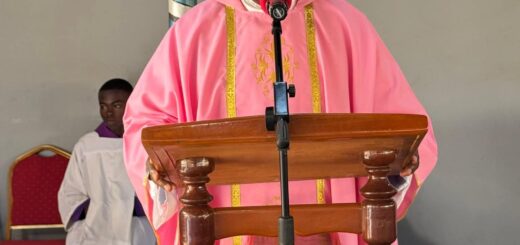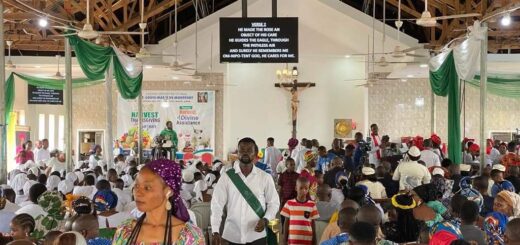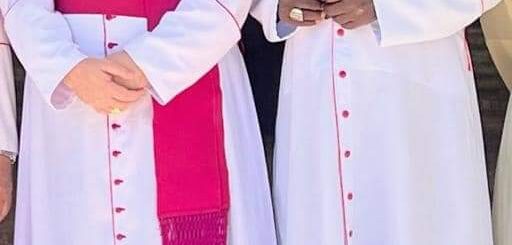CHRISM MASS AT OUR LADY QUEEN OF NIGERIA PRO-CATHEDRAL, ABUJA, 9TH APRIL, 2020.
by ARCH BISHOP · April 9, 2020
HOMILY BY ARCHBISHOP IGNATIUS A. KAIGAMA.
Facing Empty Pews!
Usually, we the priests on this day of Chrism Mass all gather in the Cathedral in the presence of a large congregation. Today, the people are not present here. Their absence today is not deliberate neither is it a sign of rebellion or ingratitude to God.
You too my brother priests in your parishes and rectories cannot come to join us as we do every year on this day dedicated to the renewal of our priestly promises. Here, we have only the deans, who are representing you in the different deaneries and who will bring back to you the oils of the sick, oil of catechumens and the oil of Chrism which we shall bless at this Mass.
The order to stay at home on account of coronavirus, a kind of “forced monastic enclosure”, offers us the opportunity to do some soul searching. We hope that by the time our people return and our pews are filled up once again, we priests shall be even better and more fully equipped and the people will find us like the Israelites found Moses when he returned from prayer on Mount Sinai. In Ex. 34:29, we read that the skin of Moses’ face was shining/radiant as a consequence of his encounter with God.
Yes, we are forced to stay at home, maintain physical distance and to avoid public liturgical celebrations on account of the coronavirus, but we have not been told to avoid communion with God. This is actually a providential period for intensified communion with God. We therefore ask God for more graces so that our character and general life will always show the mark of our priestly consecration. Our attitudes, manners, temperaments and relationship with people must show that we are in a special loving relationship with God and that we truly belong to God.
Our Chrism Mass is celebrated with such a limited number of participants to avoid a huge congregation. This is part of our sacrifice and contribution to the aggressive war by the Nigerian government against the deadly coronavirus which like the roaring lion is threatening to eat us all up. God forbid!
The oils we shall bless here will be used for us and our people as usual, and even during the post-coronavirus era. These holy oils in the tradition of the Catholic Church are a sacramental therapy for us. Received with deep faith they can infuse supernatural strength into us and can heal us spiritually and physically; they are a constant reminder that God’s healing compassionate disposition never ceases or weakens or fails. By using the oil at baptism, confirmation, priestly or episcopal ordination; using it on Catechumens preparing for baptism and anointing the sick, we are strengthened on our journey to heaven; to be able to keep serving God no matter the challenging circumstances.
Today, we priests are expected to renew our priestly commitment and service. The few priests here will do so on behalf of those of you at home, but when the situation improves or normalizes, we shall all have a Mass together to celebrate our priesthood. But for today, you can join us in renewing your priestly vows if you are watching this programme.
We all know that these are times of great stress, anxiety and fear. It is a time that calls us to listen to ourselves rather than preaching to the people from the pulpit only; to look inwards and to draw more than before, the attention of our people to consider the things that are above, not only the things that are upon the earth (cf. Colossians 3:2). The world offers only an ephemeral happiness. We are asked to renew our focus on the Lord Jesus Christ; not to take away our focus on Christ crucified on the cross or to allow our attention to be grabbed or distracted by worldly considerations. We are called to spend more quality time with God, for as St. Pope John Paul II said when he ordained priests in Nigeria in 1982, “Time spent with God is not time wasted”.
Our readings in this Mass speak of God’s “anointed ones”. The first reading (Is 61:1-3, 6, 8-9) recalls the suffering Servant of Isaiah, the Responsorial Psalm (Ps 88:21-22, 25, 2) speaks of King David and the Gospel of Luke (Lk 4:16-21) speaks about Christ Jesus our Lord. All three texts have this in common: the anointing that we receive as servants is meant in turn to anoint God’s faithful people; we are anointed for the poor, for the heartbroken, for prisoners, for the oppressed, for those who mourn etc.
Our vocation as priests involves not only maintaining a sound relationship with God, but also reaching out to the unreached, the neglected, marginalized, stigmatized and socially deprived. Thus, what Prophet Isaiah refers to in Is 61 about the mission of the suffering servant is an apt definition of the social role of the priest.
Dear brother priests, we are called to serve selflessly and to be like Jesus, who went about doing good and healing all those oppressed by the devil, for God was with him (cf. Acts 10:38). The temptation to self-centeredness or personality cult in which case some preachers draw attention to their prowess of working “miracles”, captivating eloquence and dramatic presentation of the message of the gospel which shifts the honour and praise to themselves rather than to Jesus must be avoided. The temptation to prosperity preaching and undue emphasis on prophecies and political predictions must give way to a gospel-based emphasis on personal encounter or communion with God and holiness of life which if all practitioners of religions are sincere with, will inevitably lead to greater progress, equity, justice, love without barriers and a harmonious society.
At this time when people cannot go to Churches and Mosques, ministers of religion should ask what they can do for the people rather than what the people can do for them. Ministers must reach them through the electronic or print media, preaching sermons that bind us together in humanity rather than to set us against one another.
The message of solidarity, fraternity, forgiveness, reconciliation and our common humanity should ring from our Mosques and Churches (even without congregations) more loudly than ever.
Now that we don’t have the luxury of public liturgical gathering or celebration perhaps God is calling us to explore other ways of pastoral service and evangelization. I thank some of you who have used the social media effectively to spread the word of God, to counsel and to pray with your parishioners.
Obviously, God wants us to travel another path which leads to where God is worshipped in spirit and in truth. The multiplication of houses of worship, the ubiquitous and splendid worship structures and the loud noise that keep people awake all night in the name of religion should give way to the practice of religion that only helps all adherents to sincerely fear God and which translates into the genuine love of neighbour.
Let me conclude by reminding us priests on our day in which we recall the institution of the priesthood by Jesus Christ that the priesthood is:
1. A surpassing beauty in our hands
We are ordinary, sinful human beings who have been called and chosen by God’s Messiah to carry forward His mission of redemption in the midst of our brothers and sisters. This implies that as priests, by virtue of ordination, we have received something which never disappears, something that changes us and makes us different from all others. God takes possession of us from that moment and consecrates us to His service for the benefit of the rest of mankind.
2. We are consecrated to God
At every moment, whether we are performing the highest and most sublime acts as well as when we are involved in something vulgar, despicable and pretentious behaviour, whatever we do, whatever attitude we adopt, whether we like it or not, they will always be the actions or attitudes of priests, because we are priests always and all times down to the very depths of our being by virtue of the consecration received.
Priestly consecration does not however only bring honour and prestige, it also imposes very serious obligations. As consecrated men, priests are required to give themselves up and no longer claim ownership of their lives. “I, the Lord am holy, and have separated you from the peoples, that you should be mine” (Lev. 20:26). As St. Paul says, “None of us lives for himself, and none of us dies for himself. If we live, it is for the Lord and if we die, it is for the Lord. So whether we live or die, we are the Lord’s” (Rom 14:7-8).
3. Let us maintain our priestly focus
For us priests, this challenging period affords us an opportunity for serious meditation on our calling as well as all the demands that such calling makes on us. Though full of worries and fears, this could also be a period of grace, offering us once again the opportunity for growth in intimacy with our Lord Jesus Christ; to become better witnesses to the Gospel in the world of today. Let us make it a period for heightened priestly spirituality; for prayer, for pouring of ourselves for others (kenosis).
4. Always discern the direction of our lives
Discerning the direction of our lives, means a time for stocktaking, for renewing old commitments and for asking forgiveness for deviations and infidelities. We must go back to the very roots of our vocation. We should also develop a creative approach to pastoral ministry at a time when the COVID-19 pandemic period gives us priests enough time of solitude to think and to pray more. Our people must remain central in our thoughts and prayers, especially during this Holy Week which we will be forced to celebrate without them.
They need to be helped to realize that we face this frightening situation together. Our decision to comply with government orders to stay at home is meant to protect life which is sacred.
5. Pray ceaselessly and fervently
As we continue to pray for ourselves, the people of our Archdiocese, our families and friends, let us not forget to pray for the many victims of this terrible disease and their families. May we pray too for those who are working around the clock to find a cure. We pray for medical personnel and for political leaders as well. May God pour into our hearts His Holy Spirit, our Advocate, to give us the strength and calm we need at this difficult time.
Let us also continue to seek the maternal intercession of Mary, Mother of priests, who never despises her children; she walks at our side, she shares our struggles and she constantly entrusts our cares unto her Son who never despises her requests.
Dear brother priests, let us remain strong spiritual pillars for our people.
May God continue to bless us priests along with all the people we serve. Amen.








